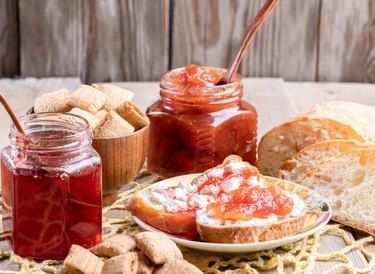
Potassium sorbate is a preservative used in different types of packaged foods to prevent them from being spoiled by microorganisms, namely fungi (such as mold) and certain bacteria. It's also classified as a food additive.
"Potassium sorbate is used to help make food safe by curbing microbial growth," says Isabel Maples, MEd, RDN, a spokesperson for the Academy of Nutrition and Dietetics. "It's there to help extend shelf life [of packaged food]."
Video of the Day
Video of the Day
The compound was first discovered by the French in the 1850s to prevent mold growth in various foods, according to the U.S. Department of Agriculture (USDA). Potassium sorbate is naturally found in the mountain ash tree's berries and is now also produced synthetically in labs.
It is the salt derivative of sorbic acid, an unsaturated fat that's also used as a food preservative.
What Foods Is Potassium Sorbate Found In?
The additive is found in more foods than you might think. Because it's tasteless and odorless, potassium sorbate is used to help a wide range of foods stay fresh, according to the Center for Science in the Public Interest (CSPI). These include:
- Cheese
- Baked goods
- Dried fruits
- Syrups
- Jams and jellies
- Smoked meat and fish
- Yogurt
- Pickles
- Herbal dietary supplements
It's also a key player in wine production because it stops the yeast from continuing to ferment in the bottles, notes the Iowa State University Midwest Grape and Wine Industry Institute.
Is Potassium Sorbate Safe to Eat?
The general consensus is yes. The U.S. Food & Drug Administration (FDA) and the watchdog organization CSPI agree that potassium sorbate is generally safe to consume. The additive doesn't accumulate in the body — instead, it breaks down into carbon dioxide and then water in the body, according to the Encyclopedia of Food Sciences and Nutrition.
"It's very safe," agrees Maples. "It's been in use for a long time."
Not only is potassium sorbate considered safe, but it also helps protect consumers from some potentially very nasty bugs. A study published in the November 2016 issue of the International Journal of Food Microbiology found that potassium sorbate helped neutralize salmonella in beef jerky. Salmonella is responsible for over one million illnesses every year, according to the Centers for Disease Control and Prevention (CDC),
How Much Potassium Sorbate Is in Your Food?
Potassium sorbate is generally recommended as safe to consume, according to the FDA and the CSPI. Defined as a food additive and preservative, it’s used in very small quantities. Although the specific amount varies by manufacturer, federal law dictates that a product cannot contain more than 0.3 percent potassium sorbate by weight, notes the USDA.
Side Effects of Potassium Sorbate
Findings in a January 2019 review in the journal Acta Biomedica show that potassium sorbate can potentially trigger an allergic reaction, though these reactions are rare. The ingredient also has the potential to irritate the skin when it's used in personal care products, but these kinds of reactions are also uncommon, according to the Environmental Working Group (EWG).
In all, the likelihood of potassium sorbate causing harmful side effects is very low. But if you experience signs of a possible allergic reaction (like mouth tingling, swelling, itching or hives), stop eating or using the product, recommends the Mayo Clinic.
Always seek medical attention for severe allergic reactions like facial swelling or trouble breathing.
Avoiding Potassium Sorbate
Because potassium sorbate is so widely used, it can be difficult to avoid. You can reduce your exposure as much as possible by reading ingredient lists, or if that's not possible, limiting your intake of foods that tend to use the ingredient in general.
Eating more homemade food and steering clear of packaged or processed foods can help too. When you prepare food from scratch yourself, you're more likely to know exactly what's in it.
- Isabel Maples, MEd, RDN, spokesperson, Academy of Nutrition and Dietetics, Atlanta
- Andreozzi L et al. (2019.) Hypersensitivity reactions to food and drug additives: problem or myth?
- Centers for Disease Control and Protection. (2021.) Salmonella.
- Center for Science in the Public Interest. (2021.) Chemical cuisine.
- Cornell University, Cornell Cooperative Extension. (n.d.) Potassium sorbate profile.
- Environmental Working Group. (2021.) Potassium sorbate.
- Iowa State University Midwest Grape and Wine Industry Institute. (2021.) Sorbic acid.
- Juneja V et al. (2016.) Development of a predictive model for Salmonella spp. reduction in meat jerky product with temperature, potassium sorbate, pH, and water activity as controlling factors.
- Mayo Clinic. (2020.) Allergies.
- Science Direct. (2021.) Sorbic acid.
- US Department of Agriculture, CFNP TAP Review. (2002.) Potassium sorbate.
- US Food & Drug Administration. (2020.) Code of federal regulations title 21, volume 3.